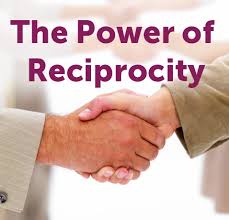“There is one word which may serve as a rule of practice for all one’s life: Reciprocity.”
–Confucius
“The basis of social relationships is reciprocity: if you cooperate with others, others will cooperate with you.”
–Carroll Quigley
“Always go to other people’s funerals; otherwise they won’t go to yours.”
— Yogi Berra
I recently was volunteering time at my local high school teaching interviewing to some law and criminal justice focus students. As I was leading them through some of the principles of interviewing, I talked about the power reciprocity in the interview room. I saw many blank stares and when I asked, not one of those juniors and seniors knew what reciprocity was. I was a little shocked, but realized the word is not part of their vernacular, but the concept has likely been honed in their relationships with friends and parents.
So not to be too basic, here is what reciprocity is:
rec·i·proc·i·ty: ˌresəˈpräsədē/; noun
- the practice of exchanging things with others for mutual benefit, especially privileges granted by one country or organization to another.
“One country or organization,” or in interviewing, one person to another. We know what it is. The example I always use is you and your significant other heads to some “friends’” house for dinner. As you sit down to dinner they serve up the worst meal that you’ve had in a long time and announce that after dinner they have 3000 plus slides of their recent trip to Toledo that they really want to show you. Three hours later while on the way home, you are lamenting that you can never get those hours back, how bad the food was, and how excruciating the slide show was. As you pause during your diatribe, your significant other states, “we’ll have to have them over for dinner”………WHAT? That is the theory of reciprocity in practice…..we feel obligated.
Reciprocity is a valuable commodity in the interview room. Recognize that it must be deployed with credibility, because credibility is a huge reason the interviewee tells us what they did. So if being judgmental is one of your tools, and you employ it, credibility then says you can’t effectively use reciprocity. Judging is not our responsibility as interviewers, so leave it home in the same closet with your biases. Reciprocity must be employed with sincerity to maximize that issue of credibility.
Why does reciprocity work? Well, it is the way most of us are psychologically conditioned, and how the majority of us were raised. The practice doesn’t look the same in each of our lives, but the concept is remarkably similar. What you give does not have to be material, but it does have to be of value to the receiver. There are two types of reciprocity; emotional reciprocity and material reciprocity. A compliment, a thank you, even a handshake, can be that emotional item, maybe even more than a cup of coffee and a donut. It is amazing though how valuable coffee and donuts can be in a correctional setting, as I’ve completed tons of interviews there, and they were like diamonds. Regarding emotional reciprocity, remember it is the value to the receiver. I saw an interview with a convicted murder who credits the detective’s handshake (first time a law enforcement officer in 40 plus years had ever shaken his hand) with his willingness to talk and confess to the murder.
The premise of reciprocity is fair play. It is only fair if I give back, we have a deep need for things to be even. Those kind words, good listening, and showing understanding can result in information you didn’t expect. But remember, you can’t flip in and flip out of being credible. Going from Mr. Rodgers to Attila the Hun during the interview, does not demonstrate credibility. Think of it in your own life; someone goes from yelling at you to trying to be your friend, you know how much time you would have for them. The reverse of positive reciprocity works too. You talk to someone nastily, don’t wonder why they reciprocate.
Employ the Socratic Method; the more you ask and the better you listen, the better they will be toward you. So ask good questions and employ all your faculties in active listening. From early on in the interview find those things that you can agree on. Establish commonality via quality rapport.
We need to become accustomed to deploying reciprocity in our interview landscape. When you do, notice its effect on completely eliciting the greatest quantity and quality of information possible.
Anderson Investigative Associates is positioned to custom tailor training to your specific needs. If you have any questions, or would like to discuss the above or any training need, please reach out to me. Additional issues pertaining to interviewing and investigations can be found in other blogs that I have written and are contained in most blocks of instruction that our company presents.

